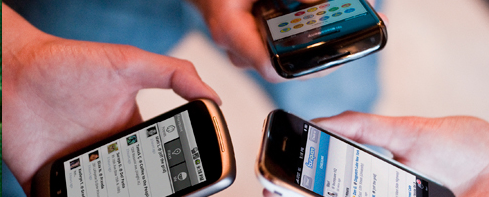Social media and online marketing are a crucial part of any clients communications strategy, and it’s a vital area that PR agencies need to be on top of. Brands need to understand that they are being talked about online whether they like it or not, and being a part of the conversation is (in most cases) the best strategy to have.
I have put together a little list tools and trends which I believe PR’s and those pulling communications strategies together need to be watching out for…
- Geolocation – Tools such as FourSqaure and Facebook Places have adapted to an increased usage of mobile internet which is now becoming more and more advanced every day. New tools keep appearing every day such as Bizzy, a check-out switch on the traditional FourSqaure idea. There are also many recent developments with Groupon, who have launched Groupon New, which is based on their ever so successful deals and special offers. You highlight your preference ‘hungry’ or ‘bored’ and based on your location Groupon will give you a range of activities or places to visit.
 (Image from http://www.socialmediaexaminer.com)
(Image from http://www.socialmediaexaminer.com)
- Keep you eyes open for new developments and news on this ‘Geo-location’ based topic which could change ways brands can interact. This is especially interesting for the tourism industry’s point of view, as many are using this to rate places people visit e.g. restaurants, bars, museums etc. On the other hand, read the recent news regarding iPhone’s Tracking device… this privacy issue could cause problems to these types of apps in the future.
- Crowd Sourcing – Not a new idea, but one which is constantly been developed through the use of social media and online communications. Large brands such as Starbucks are engaging with customers through allowing customers to share their ideas and views, and therefore feeling apart of the brand. As people become more experienced online, this concept will be reachable to a larger audience and not just the social media experts.
- ‘Likeonomics‘ – Is a term used to describe the way the public interact with brands and push their options out into the open, this is done through ‘likes’ on Facebook and personal comments through Twitter. Consumers are constantly looking for personal recommendations and what our peers are commenting about, sharing and ‘liking’. Therefore if done well, brands can inspire ‘word of mouth’ through social media platforms and encourage further brand awareness and loyalty.
- Near Field Communication Technology – This advancement is said to lead to half a billion people worldwide using their mobile devices as travel tickets by 2015. This technology is already in use, but is a working development. Retail outlets such as McDonald’s are already in progress in using this technology to purchase products. Certainly one to watch out for!
- Quora – This site is a continually improving collection of questions and answers created, edited, and organized by everyone who uses it. An important tool to consider key ‘influencers’.
- Scribblelive – I have added this little tool in as it’s a great tool for keeping up to date with the ‘culture’ of now. This tool enables real-time journalism and audience engagement without any delays. Brands can also publish live real-time content and reach internet consumers demands.
- Zipcast is a relatively new online meeting programme. This works through SlideShare, so you can not only just upload your presentation, but can now hold an online conference and speak through your presentation with your audience. This tool is a competitor to the previous Webex online meeting device.
- Bar code scanning is a development which could change the way we shop. You have probably already seen recent adverts on TV which highlight how iPhones can add products to an online shopping list. Apps can now compare in-store prices whist you are shopping. E.g. Tesco iPhone app:
 Again, these developments are taking on ‘recommendations’, so when you scan a product you are subject to a world of peer / consumer feedback. It’s these changes that brands need to be aware of, as consumer comments can be extremely powerful – you can see this through sites such as Tripadvisor.
Again, these developments are taking on ‘recommendations’, so when you scan a product you are subject to a world of peer / consumer feedback. It’s these changes that brands need to be aware of, as consumer comments can be extremely powerful – you can see this through sites such as Tripadvisor.
This is just a little list of developments which I thought would be useful to highlight. Do comment or let me know about any more advancements which you feel should be included within this list. There will be those that I have missed as the internet and social media is changing vastly and quickly and keeping up with all changes is a challenge, but an extremely interesting one.



